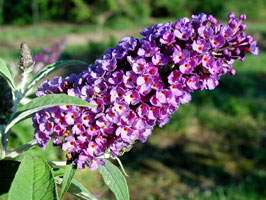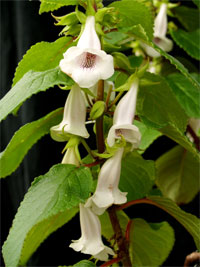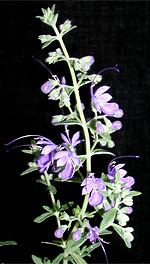 |
|
Dr. Jon Lindstrom,
associate professor of horticulture at the
University of Arkansas, examines tissue cultures
of a cultivated variety of Trichostema, or blue
curls, released by the University of Arkansas
under the name "Blue Myth." Because the plant is
sterile, tissue cultures are used to propagate
the variety. |
|
Fayetteville, Arkansas
November 15, 2006
Jon Lindstrom describes himself as
a “plant geek.” “I like plants,” he said. “So I always knew that
plant breeding would be part of what I would do.”
Lindstrom is an associate professor of horticulture in the
University of Arkansas
Division of Agriculture and the Dale Bumpers College of
Agricultural, Food and Life Sciences. When he’s not in the
classroom, “showing students plants and making them learn those
awful Latin names,” he can often be found in a greenhouse making
careful crosses between ornamental plants, looking for a
combination that will produce something interesting and useful
for the home or garden.
His efforts have resulted in three
new ornamental plants just released from the University of
Arkansas:
-
a Buddleja, or
butterfly bush, named Asian Moon;
-
a Trichostema,
also known as blue curls, named Blue Myth; and
-
a Gesneriad,
related to African violets, named Mount Magazine.
Lindstrom said
Asian Moon is a symmetrical, round shrub with light purple
flowers that serves the same purpose as other Buddleja. Known
for attracting butterflies, the shrubs are well suited for use
in landscaping. Asian Moon has been evaluated in test plots at
Fayetteville, Little Rock and Hope and has shown to over-winter
well in all three locations.
A significant advantage for Asian Moon, Lindstrom said, is that
it is sterile. Because it doesn’t set seeds, it will not escape
cultivation and become invasive, as the species is known to
become in some areas of the country. Also, because it doesn’t
set seed, the flowering stage is extended, resulting in
longer-lasting blooms.
Blue Myth, the Trichostema, is
also sterile. “Nowadays, with so much concern about invasive
species, sterility is a desired trait in garden plants,”
Lindstrom said. Bruce Dunn, a Ph.D. graduate, made the cross
that produced this plant.
 |
|
A variety of
Buddleja named "Asian Moon" has been released by
the University of Arkansas. Also known as a
butterfly bush, it is suitable for use in
gardens and landscaping. |
|
As with Asian Moon, Blue Myth
has an extended flowering because it doesn’t set seed. It also
grows in a symmetrical, rounded shrub. It has not been tested
for over-wintering in Arkansas, but Lindstrom said he envisions
the plant more as a potted or container plant that can be
brought inside during the winter.
Mount Magazine is a novelty plant that will be of interest to
hobbyists who cultivate gesneriads, Lindstrom said. It may also
be suited for use as landscape plant in frost-free areas or in
conservatories.
Lindstrom has proposed the full name for this plant to be
Sinvana Mount Magazine, but the American Gloxinia and Gesneriad
Society, which is the authority responsible for registration of
new hybrids in the Gesneriaceae family, has not yet approved it.
Mount Magazine has fragrant
white flowers with lavender lines in the throat, produced on a
shrubby plant beginning in mid-summer and continuing through
fall.
All three of the new plants will be available during the annual
Horticulture Department Plant Sale April 21, 2007, Lindstrom
said. Later they will be available from commercial nurseries as
unrestricted public varieties.
Lindstrom has a few other new ornamental hybrid plants that he
expects to release soon. Meanwhile, he is always on the lookout
for interesting plants with landscaping potential.
“I’m looking for non-invasive plants with interesting colors and
useful traits like drought tolerance,” Lindstrom said. He’s also
looking for plants that have not been crossed frequently in the
past.
“There are a lot of interesting plants to work with,” he said.
 |
|
A
variety of gesneriad, a relative of
the African violet, has been
released by the University of
Arkansas under the name "Mount
Magazine." |
|
|
 |
|
A
variety of Trichostema, known as
blue curls, has been released by the
University of Arkansas under the
name "Blue Myth." The cross was made
by Bruce Dunn, a Ph.D. graduate of
the Department of Horticulture. |
|
|
|